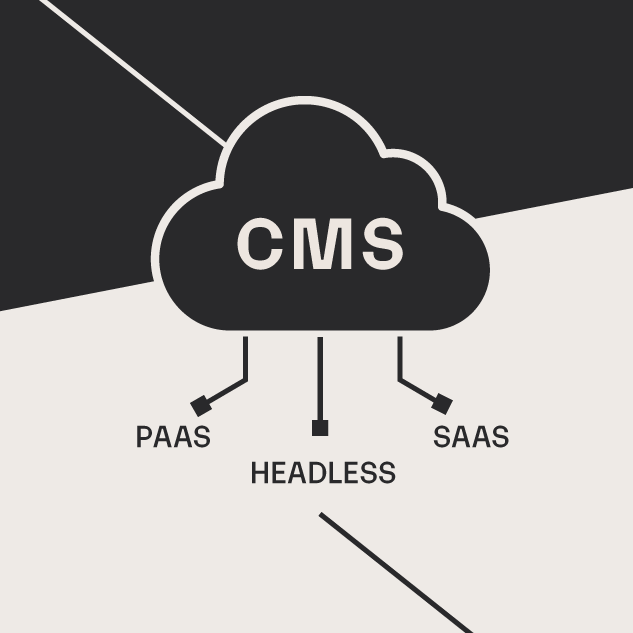You Should Migrate Your CMS to the Cloud. Here's Why.
Chris Osterhout SVP of Strategy#CMS, #Digital Strategy

Thinking about migrating your CMS to the cloud? Here are 6 key benefits to understand.
In today's digital landscape, the way content is managed and delivered is evolving rapidly. With the increasing demand for seamless, efficient, and secure access to data, many organizations are shifting their Content Management Systems (CMS) from traditional on-premises setups to cloud-based solutions. This transition is not just a fleeting trend; it represents a fundamental change in how businesses manage their digital content. In fact, in most cases, a CMS migration to the cloud is often the catalyst for other organizational IT cloud migrations. Let's explore the advantages of migrating your CMS to the cloud, including scalability, flexibility, enhanced security, and potential cost savings.
Scalability: Growing with Your Needs
One of the most compelling reasons to migrate your CMS to the cloud is scalability. Cloud-based CMS platforms offer unparalleled elasticity, allowing businesses to scale their resources up or down based on changing demands. This means that during peak periods, such as seasonal marketing campaigns or product launches, you can effortlessly increase your capacity. Conversely, during quieter times, you can scale down, ensuring that you're not paying for unused resources.
In an on-premises setup, scalability often means investing in additional hardware or enduring lengthy procurement processes. With cloud CMS, these barriers are eliminated. The ability to scale on demand ensures that your CMS can grow with your business, without the need for significant upfront capital investment or the risk of resource underutilization.
Enhanced Flexibility: Services and Solutions at Your Fingertips
The true power of the cloud lies in its remarkable flexibility. A cloud-based CMS is not just a tool for content management; it's a gateway to an endless number of services designed to enhance your digital capabilities. This includes options like load balancing, global redundancy, automated scaling, content delivery networks (CDN), application insights, and more, all available with just a few clicks. These features would historically take months to implement, but in the cloud, can be completed in a matter of days.
It's this extensive flexibility that allows organizations to adapt to business changes in a fast-paced digital landscape where time-to-market can make the difference between business success and failure.
Enhanced Security: Safeguarding Your Data
Security and data privacy concerns are top of mind for most organizations. Cloud-based CMS platforms are generally more secure than their on-premises counterparts. Providers of cloud services, such as Microsoft Azure and Amazon Web Services (AWS), invest heavily in security measures, including regular updates, advanced encryption, and robust disaster recovery protocols. This commitment to security means that your data is protected against a range of threats, from cyberattacks to physical disasters.
Additionally, the cloud's centralized nature makes it easier to monitor and manage security. Rather than juggling multiple security protocols across various on-site servers, the cloud offers a unified approach to security management. Regular backups and redundancy systems further ensure your data remains safe and recoverable, even in unexpected incidents.
Potential Cost Savings: Maximizing Your Investment
Migrating to a cloud-based CMS can lead to significant cost savings. With the cloud, the capital expenditure associated with purchasing and maintaining hardware is replaced by a more predictable operating expense model. You pay for what you use, which can lead to lower overall costs, especially for small to medium-sized businesses.
Operational efficiencies are another area where cost savings are evident. The cloud's ease of use and accessibility can reduce or eliminate the time and effort required to manage the CMS’s infrastructure. This means a reduced need for your in-house IT team to maintain and support your CMS implementation. This will free up team members to focus on more strategic, revenue-generating activities.
Continuous Improvement and Innovation
Cloud-based CMS platforms are continually evolving. Cloud providers regularly roll out updates, upgrades, and new features, ensuring that your CMS stays current with the latest technological advancements. This means that your CMS is not just a static system but a dynamic platform that evolves to meet the changing digital landscape.
This continuous improvement extends to compatibility and integration with other tools and systems. Cloud CMS platforms are designed to work seamlessly with a range of applications, from analytics tools to marketing automation software, ensuring that your digital ecosystem is cohesive and efficient.
PaaS vs SaaS Cloud CMS Platforms: Tailoring to Your Business Needs
When choosing between Cloud CMS platforms, you often come across two terms: Platform as a Service (PaaS) and Software as a Service (SaaS). It's crucial to consider how each aligns with your business needs. PaaS CMS providers offer a combination of hosting, licensing, and in most cases, some level of CMS security patching, all wrapped up in a single product. These platforms are ideal for organizations which need heavy customization and integration with their websites.
On the other hand, SaaS offers a more out-of-the-box solution. A SaaS CMS (which should not be confused with a headless CMS), is a fully developed platform managed by the service provider, requiring minimal technical effort from your side. It's a perfect fit for businesses that prefer a ready-to-use solution with lower upfront development time and cost. SaaS CMS platforms are generally user-friendly and require less technical maintenance, allowing your team to focus more on content creation and less on the technicalities of the platform. However, depending on what type of SaaS CMS you select, it may limit your ability to tailor the end solution to your specific business requirements.
The choice between PaaS and SaaS ultimately depends on your business's specific needs. If you require a highly customized CMS and have the technical resources to build and maintain it, PaaS could be the way to go. However, if you're looking for ease of use, quick deployment, and lower maintenance, a SaaS CMS might be more suitable. Each offers distinct advantages, and the decision should align with your business strategy, technical capabilities, and long-term digital goals.
Conclusion: Embracing the Cloud for a Competitive Edge
The migration of your CMS to the cloud is not just a technical decision; it's a strategic move that can provide your business with a competitive edge. The scalability, flexibility, enhanced security, potential cost savings, and continuous improvement offered by cloud-based CMS platforms make them an attractive choice for businesses looking to thrive in the digital age.
As we move forward, the cloud is set to become an even more integral part of the digital transformation process. Businesses that embrace this technology will be well-positioned to adapt to changing market demands, innovate faster, and deliver exceptional experiences to their customers. The transition to a cloud-based CMS is not just about keeping up with the times; it's about setting your business up for future success.
Related Articles
Results Matter.
We design creative digital solutions that grow your business, strengthen your brand and engage your audience. Our team blends creativity with insights, analytics and technology to deliver beauty, function, accessibility and most of all, ROI. Do you have a project you want to discuss?
Like what you read?
Subscribe to our blog "Diagram Views" for the latest trends in web design, inbound marketing and mobile strategy.



